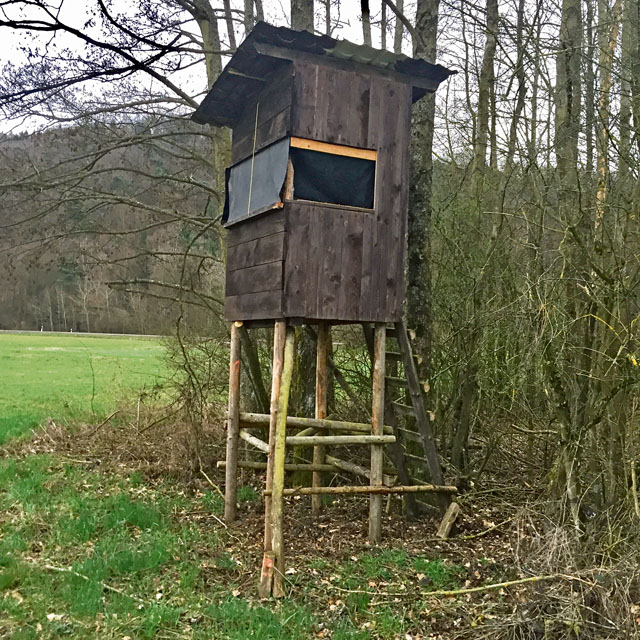Numerous fun and rewarding outdoor activities are available to Americans who come to live and work in Deutschland. Some of them, such as hunting and fishing, require a short process of certification whereby a person can become eligible to pursue the harvesting of wildlife here.
When discussing the subject of hunting and fishing for Americans living in Germany, Brandt Gardner, who works at the Baumholder Outdoor Recreation office, is quick to dismiss a few myths, such as how hard it supposedly is to pursue those hobbies or what limitations U.S. citizens might face.
“Under Army regulations there are certain things you have to do before you can hunt or fish and one of them is the courses you can take through our offices that will get you certified and in line with German regulations,” said Gardner. Interested participants are able to enroll in classes with Outdoor Recreation at various locations, including Baumholder, Pulaski Barracks Kaiserslautern and Ramstein.
Visit a castle along the Rhine and there will always be a room or two that is adorned with all kinds of trophy mounts, racks, and various firearms hanging on the walls. Many restaurants also have an ambiance that focuses on hunting and fishing. The great outdoors is a huge deal to locals and soon after establishing a permanent military presence here in the 1950s, U.S. military officials began working toward the establishment of a process whereby Americans could avoid having to look off-base for hunting and fishing certifications.
The idea was to instead allow U.S. citizens living here to clear all requirements through their own chains of command. This process is straightforward and clearly defined today.
“A lot has changed since I got my hunting license through the Rod and Gun Club at Hahn Air Base,” said local hunter and retired Air Force member Jim Gruenberg. “Hunting here is more regulated and structured. I’ve enjoyed hunting in the United States, too, but I can tell you there is a lot of prestige associated with being an outdoorsman and a hunter here in Germany.”
Thousands of U.S. service members, civilians, and contractors have become eligible through the years to seek wild boar, deer, duck, pheasant, and other wildlife including a variety of indigenous fish in the rivers and other waters of Deutschland.
“I went through classes at Stuttgart in 1988 and we were there for six months, once a week,” said Ramstein High School math teacher Steve Falkenberry, a longtime outdoors enthusiast who manages a local revier, a leasing of an acreage of land, which he and others hunt on throughout the year. As manager of a tract of land, Falkenberry has the title of jagdpaechter (hunting tenant) and anyone who wishes to be granted similar status with a revier must have been certified in Germany for at least three years.
People who don’t desire to hunt through the revier system can contact the German Ministry of Nature and Environment to discuss multiple local or booked hunts plus other options available to certified hunters. It is a sport open to all ages, too, with adolescent hunters able to earn a youth license that allows them to hunt or fish alongside adults.
Course lengths and time frames vary now but military garrisons here usually offer only two courses per year. The fishing certification process does not take as long to complete as the hunting and bodies of water are leased to certain people, much like the revier system for hunting. That certification allows people to go out on the economy and purchase a fishing permit and to actually fish in designated waters here.
“Germany does not have the large scale hatchery programs that are seen in the United States and the law here requires the rights owner to make reports of what species and how many have been taken from the waters,” Gardner said. “And it is the responsibility of whoever has the rights to stock those waters each year and be aware of what types of fish populate any and all bodies of water that are used for fishing. They report all of that information to German authorities.”
Germany is, by most accounts, one of the toughest countries to earn hunting and fishing certifications. Those who seek certification must pass shooting tests, show knowledge of proper field dressing techniques, demonstrate safety and field awareness, and have a high acumen for all things related to the sport.
Another myth that Gardner points out is that it is illegal for U.S. personnel to own firearms here.
“This is one of the most highly-regulated and well-managed systems of firearms ownership that you will see anywhere,” Gardner said. “The German government has a very good rapport with the whole registration aspect and they are clear on what a person is responsible for if they want to own a firearm. Once a person has been certified, there are several places to buy firearms here and there are many (U.S. personnel) who own firearms for hunting.”
American people working here in Germany can be certain that there is a chance for them to hunt and fish, provided they adhere to German regulations and obtain proper certification. The first step to moving in that direction is to contact their nearest Family and Moral, Welfare and Recreation-sponsored Outdoor Recreation office.

Pulaski Outdoor
Recreation Office
Building 2905
(314) 493-4115 or
06313-406-4115
Ramstein Outdoor
Recreation Office
KMCC mall
DSN (314) 480-5705 or
commercial 06371-475705
Baumholder Outdoor
Recreation Office
Smith Barracks, Building 2905
(314) 485-7182 or
06783-67182







